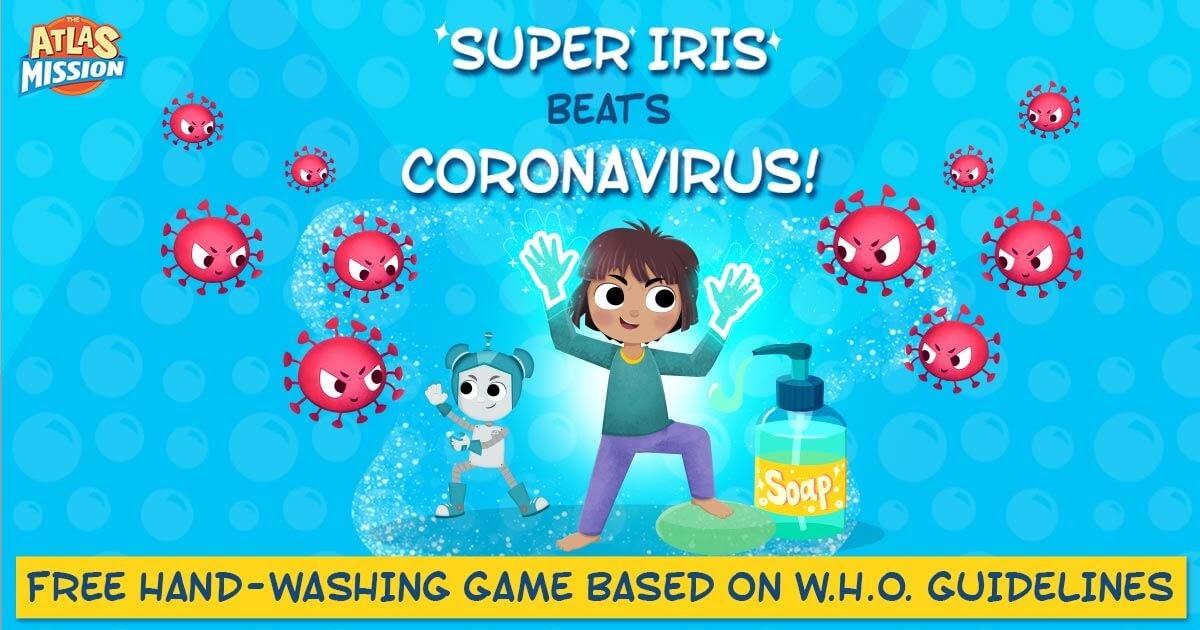The COVID-19 pandemic can make our daily lives a little scary, but by following the recommended guidelines we can help prevent the spread of germs. One of the simplest things we can do is to wash our hands. When you have little kids, the task can seem unreasonably daunting, especially since using the right method can be hard to teach. So how do we get those little ones on board without having to endlessly nag them? A little creativity can go a long way when getting kids to learn all of the correct handwashing steps. Keep your family and community as safe as possible with these six fun tips below for teaching your children the best way to wash their hands during Coronavirus Quarantine.
GET CRAFTY
Learning through the arts has many benefits including improving communication skills, motor skills, and creativity. In fact, creativity can help kids master the world around them, which is helpful when teaching a skill like handwashing. Help your child create art depicting blasting away germs with a heroic bar of soap, majestic bubbly waterfalls cascading over awaiting hands, or a favorite cuddly toy or character holding a huge bar of soap. If they can’t draw well yet, make collages from magazines or pictures printed from the internet. Another cool project is to make handmade soap. There are great soap recipes and supplies available online. Embedding little plastic animals or other trinkets inside the soap makes it extremely fun, plus they will work extra hard at rubbing the soap to set them free!

TEACHING THROUGH PLAY
Interactive play is so important for kids that the United Nations High Commission for Human Rights lists it as a right for every child. The Official Journal of the American Academy of Pediatrics states “Play allows children to use their creativity while developing their imagination, dexterity, and physical, cognitive, and emotional strength. Play is important to healthy brain development.”
Utilize play to teach handwashing by adding it to the storyline during imaginative play with toys or role-playing. Exceptional games are available online such as “Super Iris Beats Coronavirus,” which teach the importance of handwashing to prevent the spread of the virus. Super Iris encourages kids to wash their hands and shows all the places germs can hide. Using clear, guiding instructions this game uses play with hands-on learning to show how to wash away those germs.

SINGING TO MAKE IT STICK
There are many tricks to boost memory; one of the most fun ways is to sing a song. Music is a powerful tool for memory retention and a perfect way to encourage learning in children. Putting information attached to a tune is a fantastic way to embed instructions into a child’s mind. Young kids usually willingly participate in singalongs, so use it to drive the handwashing message home.

Singing an entertaining song that includes the proper technique not only reminds them of the steps but it also passes the time. Since scientists state that hands must be washed for a minimum of 20 seconds to be effective, singing can also help count out the time. There are plenty of songs that can be found online, but here are two favorites…
Tops and Bottoms (Tune of Frère Jacques)
Tops and Bottoms, Tops and Bottoms, (Rub top and bottom of hands)
In between, In between, (Rub fingers inside on both hands)
All around our hands, All around our hands, (Just like it says)
Then we wash. Bam, Bam, Bam.
This is the Way We Wash Our Hands (Tune of Here We Go Round the Mulberry Bush):
This is the way we wash our hands,
Wash our hands, wash our hands,
This is the way we wash our hands,
Before we eat our food.
The Super Iris Beats Coronavirus song is a perfect example of a catchy, engaging jingle that is sure to motivate and teach children how to wash their hands effectively.
SNEAKY CLEAN
If handwashing proves to be an exceptionally challenging skill to enforce, try some sneaky yet fun tactics on kids. Try filling the sink up with warm sudsy water, soap up a bunch of toys and let the kids plunge in and play. Let them use the dish soap to their heart’s content! Or fill a spray bottle with water and glitter, spray their hands, and have them wash until the glitter is all gone. Show kids how to soap up their hands so heavily that they can blow bubbles by forming their fingers into little circles. Or even draw on their hands with a washable marker and get them to make it disappear. Use your imagination and enjoy!

CHART IT OUT
Make handwashing charts as a reminder to post near the bathroom and kitchen sinks. Create your own chart or download one of the many printable versions that can be found online. Add little notes or drawings to make the chart funny and enjoyable for them to read again and again. Laminate the chart so it won’t get smudged or better yet make a new one every week adding new hilarious bits for other members of the family to find. Keeping them looking for surprises will have them returning to the poster in search of new jokes or illustrations will help reinforce the message. Don’t be afraid to get weird and wacky, the kids will adore it.
When creating charts, be sure to use the recommended handwashing procedures:
Step 1: Wet hands with water.
Step 2: Add soap to hands.
Step 3: Rub hands palm to palm.
Step 4: Rub the backs of both hands.
Step 5: Interlace fingers and rub hands together.
Step 6: Interlock fingers and rub the back of the fingers of both hands.
Step 7: Rub thumbs in a rotating manner.
Step 8: Rub fingertips of both hands on palms.
Step 9: Rub both wrists in a rotating manner.
Step 10: Rinse hands with water.
Step 11: Dry hands thoroughly
THE POWER OF REPETITION
For little kids, repetition is the basis of all learning, so never assume they got it the first time. Studies show that repetition is fundamental in child development, so even though it might be boring for parents it is critical to be persistent, especially in these uncertain times. For handwashing, repeating the message and extra practice is just what kids need to learn new skills.
Why is repetition so essential for kids?
• Repetition strengthens learning in the brain’s neural processors.
• Repetition reinforces a child’s ability to retain knowledge.
• Children learn by repeating and memorizing.
• Confidence is developed through repetition.
Given these points, save up extra patience and repeat for the umpteenth time!
Follow all these great tips and kids will start enjoying washing their hands and help flatten the curve and reduce the spread of COVID-19!
About Rubia Braun and Sumantra Roy
Rubia Braun and Sumantra Roy are the co-founders of the educational game company, Atlas Mission, and the creators of the Super Iris Beats Coronavirus game. Experts at crafting games that combine play with a learning objective, they developed the game to furnish parents with the perfect tool to help young children and families stay safe during this pandemic.



